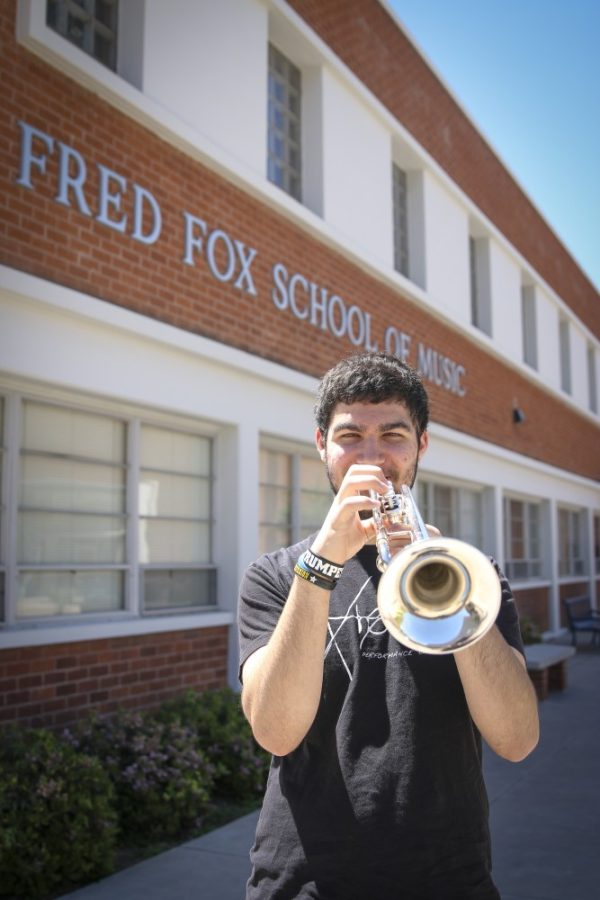Undergraduate and graduate students in the woodwind, brass and percussion studios competed against one another for the opportunity to play alongside professional musicians.
Conner Bagheri is a second-year undergraduate of Jason Carder at the UA and, because of this win, will perform Kevin McKee’s “Centennial Horizon” for trumpet and wind ensemble on Friday, April 26, in Crowder Hall.
Bagheri said he first began playing the trumpet in his sixth-grade band class. Four years later, he began studying with Frank Glasson of the San Diego Symphony.
During his high school years, Bagheri said he was instructed by John Wilds, Rob Frear, Jim Wilt and Thomas Hooten. He was a member of the California All-State Wind Symphony in 2017 and has participated in the chamber music portion of the Music for All National Festival in Indianapolis.
The Daily Wildcat talked with Bagheri about his accomplishment and his enthusiasm for his instrument.
The interview has been edited for length and clarity.
RELATED: Waves in the desert
Daily Wildcat: What was the audition process like?
Conner Bagheri: There’s a preliminary process where basically it’s all your people who are music majors that major on your instrument. For instance, the trumpet studio is all the people at the university that major in the instrument trumpet. There was a preliminary round, where only one person from each studio was able to win that round, and then they would go on to represent their studio in the next round. You just play in front of the class, and then the studio basically votes on who they want to represent them.
DW: How was your experience playing alongside professionals at the opera?
CB: It’s a lot of sitting, a lot of rests. The only reason the instrument exists for opera is for louder sections. You’re mostly listening the whole night. It’s like a free concert, that’s really what it is for trumpet. You’ll have the opening fanfare in the beginning, and you’ll play a lot of that, and then — boom — you’re resting for 200 measures, and then you’ll play like 5 minutes with no rest for another 300, and then you might have a longer section where you actually play for like 1,020 bars.
DW: What do you do during all those rests?
CB: It all depends on what is in the music. There’s so many rests where they don’t even tell you the number of rests you have it just says “tacit,” you know, Italian for “don’t play.” If you follow the music, that’s a two-hour opera, you’re going to lose focus unless you’re playing most of the time like the string players, so I just listen. Maybe I joke around with a trombone player sitting right next to me at the end of the row. We just talk about random stuff like that, but then I have cues that I’ve written in the music, or there’s cues that are written in the music if the composer was kind enough to do that for us. Once that happens, I’m ready. During intermission, some people just go backstage and watch a basketball game or football game or something.
RELATED: UAMA to hold Celebration of Life for Dennis L. Jones
DW: Could you see yourself playing in a professional ensemble one day?
CB: I want to be a freelancer when I’m older. The way it works in the professional world is if somebody calls in sick on a performance day or whatever, you can’t just play without that trumpet player. You have to call in somebody else’s sub. That’s kind of what, that’s basically what I want to do.
DW: Is the trumpet the only instrument you play, or do you play other ones as well?
CB: It’s the only one that I play and that I have an intent with to play professionally. For fun, I like to play piano. I’m not very good at it, but, you know, it’s a nice stress-reliever.
DW: What’s special about the trumpet to you that makes it different than the others?
CB: Surprisingly, the trumpet is used a lot in many different types of ensembles. I don’t think another instrument can really compare. It can be used in some rock bands and punk bands. It’s used in mariachi music and, of course, some types of Middle Eastern music. It’s used a surprising amount. I mean, it’s used in rap tracks. Recording artists literally have trumpet players improvise over a track. That’s one of the things that I find really cool about it.
Follow Maya Noto on Twitter









